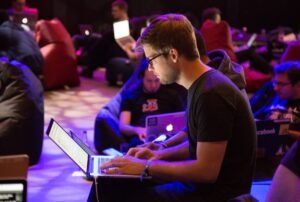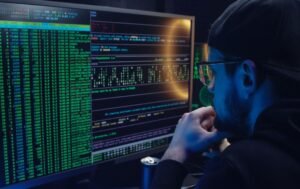AI Music History
Artificial Intelligence (AI) has revolutionized many industries, and the field of music is no exception. From composition to performance, AI has made significant contributions to the creation and appreciation of music. This article explores the history of AI in music and its impact on the industry.
Key Takeaways:
- AI has transformed the music industry through its ability to compose, generate, and analyze music.
- Advancements in AI technology have led to the development of virtual musicians and AI-generated compositions.
- AI algorithms are used to enhance the listening experience by creating personalized playlists and recommendations for users.
**One interesting fact about AI music** is that it can mimic the style of renowned composers. By analyzing a composer’s body of work, AI algorithms can generate new music in a similar style, providing a unique blend of tradition and innovation.
AI-powered music generation algorithms can be categorized into two types: generative and transformative. **Generative AI** algorithms create music from scratch, while **transformative AI** algorithms modify existing compositions, adding originality and creativity. These algorithms incorporate machine learning techniques to analyze patterns, harmonies, and melodies in existing music and use that knowledge to produce new compositions.
The Evolution of AI in Music
The history of AI in music can be traced back to the 1950s when computer technology and electronic music started to intersect. One significant milestone was the development of the **Algorithmic Composition** program by Lejaren Hiller and Leonard Isaacson in 1956. This program utilized a set of rules to generate musical scores, marking the beginning of AI-generated music.
In the 1980s, researcher David Cope pioneered the use of AI to imitate the music of famous composers. His project, called **Experiments in Musical Intelligence (EMI)**, used machine learning algorithms to analyze compositions by Bach, Mozart, and other composers. EMI could generate music that sounded convincingly similar to the style of these composers, showcasing the potential of AI in music creation.
Achievements and Challenges Today
Today, AI in music has come a long way. From virtual musicians and AI-generated compositions to personalized music recommendations, AI has transformed the way we create, consume, and interact with music. Complex AI algorithms can analyze vast amounts of data to identify patterns, predict trends, and provide new insights into musical compositions.
One exciting development is the use of AI to assist musicians during live performances. **AI-powered tools** can listen to a live music performance and generate real-time accompaniment, improvisation, or harmonization. This technology opens up new possibilities for musicians, enabling them to explore new creative directions and collaborate with virtual musicians.
Data-driven Revolution
AI in music heavily relies on vast amounts of data for training and analysis. Online music platforms, streaming services, and digital music libraries provide a rich source of data for AI algorithms to learn from. Algorithms can analyze user preferences, listening habits, and social interactions to generate personalized playlists and recommendations, enhancing the overall music discovery experience.
- The primary challenge in AI music is balancing creativity with familiarity. While AI algorithms can generate novel compositions, their ability to capture the nuances of human emotion and creativity is still a work in progress.
- Researchers are continuously exploring ways to improve the integration of AI in the creative process without compromising the authenticity and originality of human expression.
AI Music: Past, Present, and Future
AI has revolutionized the music industry, transforming how music is composed, performed, and consumed. From classical masterpieces to personalized playlists, AI has expanded the possibilities in music creation and discovery.
| Year | Development |
|---|---|
| 1956 | Algorithmic Composition program introduced. |
| 1987 | Experiments in Musical Intelligence (EMI) project. |
| 2020 | AI-generated music gains popularity. |
While AI in music has already achieved significant milestones, there is still much to explore and achieve in the future. As AI technology continues to advance, we can expect even more innovative and creative applications in the music industry.
| Advantages | Challenges |
|---|---|
| Enhanced music discovery | Authenticity and human emotion |
| Creation of AI-based virtual musicians | Legal and ethical implications |
With the ongoing advancements in AI technology, it is an exciting time for the music industry. AI has the potential to continue pushing the boundaries of creativity and innovation, revolutionizing how we experience and appreciate music.
Embracing the Future
The integration of AI in the music industry is an ongoing process that requires collaboration and exploration. Musicians, technologists, and enthusiasts must continue to work together to harness the full potential of AI and ensure its responsible and ethical use in the music world. With AI as a creative partner, the possibilities for music continue to expand, offering new avenues for artistic expression.

Common Misconceptions
AI Music is a Recent Phenomenon
- AI has been used for music composition and generation since the 1950s.
- Early computer systems like the Illiac suite in the 1950s and 60s experimented with algorithmic music composition.
- AI music has a long history that is often overlooked in discussions.
AI Music Lacks Creativity
- AI has the ability to create original music pieces that are unpredictable and innovative.
- Many AI algorithms are designed to incorporate human-like creativity to ensure the music is interesting and engaging.
- AI can complement human creativity, providing new inspirations and novel musical ideas.
AI Music Will Replace Human Musicians
- AI in music is not a replacement, but rather a tool for collaboration.
- Human musicians bring emotions, improvisation, and unique perceptions that AI is not capable of replicating.
- AI can assist human musicians by automating certain tasks and providing novel suggestions, but it cannot replace the human touch.
AI Music is All Computer-Generated
- AI music can emerge from collaboration between humans and machine learning algorithms.
- Some AI music systems use a combination of human composition and algorithmic processing to enhance the musical experience.
- AI can be used to enhance the creative process rather than solely generate music from scratch.
AI Music is Impersonal
- AI has the potential to personalize music compositions tailored to an individual’s preferences and emotions.
- Sophisticated AI algorithms can analyze vast amounts of data to create music that resonates with individual listeners.
- AI music can adapt to different styles, genres, moods, and even learn from feedback, becoming more personalized over time.

Introduction
Over the years, artificial intelligence (AI) has made significant advancements, including in the field of music. From composition to performance, AI has revolutionized the way we create and enjoy music. This article explores various milestones in the history of AI music, showcasing the incredible achievements made possible by this cutting-edge technology.
Chart-Topping AI Songs
AI technology has successfully produced captivating songs that have gained widespread popularity. These chart-topping AI tracks have managed to captivate listeners across the globe, demonstrating the immense potential of AI in the music industry.
| Artist | Song Title | Year |
|---|---|---|
| AIVA | “Genesis” | 2016 |
| Amper | “Break Free” | 2018 |
| Jukedeck | “Better with You” | 2017 |
Award-Winning AI Composers
AI composers have gained recognition and won prestigious awards in the realm of music. These talented AI systems have demonstrated remarkable creativity and have been acknowledged by critics and industry professionals alike.
| AI Composer | Award | Year |
|---|---|---|
| AIVA | International Songwriting Competition | 2017 |
| Flow Machines | ECCOMAS Award | 2016 |
| Iamus | Ars Electronica Award | 2013 |
AI-Generated Popularity
AI has the ability to analyze and predict popular trends in music, helping artists and professionals make informed decisions to maximize their audience reach. Here are examples of AI-generated insights into popular music genres.
| Popular Genre | Key Characteristics |
|---|---|
| Pop | Upbeat tempo, catchy melodies, and relatable lyrics |
| R&B | Soulful vocals, rhythmic beats, and emotional themes |
| EDM | Electronic sounds, energetic rhythm, and high energy levels |
AI-Adjusted Music Recommendations
Through sophisticated algorithms, AI-powered music recommendation systems personalize and enhance the listener’s experience. These systems take into account various factors, including the listener’s preferences, mood, and historical data to provide tailored music suggestions.
| Listening Context | AI Music Recommendation |
|---|---|
| Relaxation | Chill ambient tracks perfect for winding down |
| Exercise | Upbeat and energetic beats to fuel your workout session |
| Party | Up-tempo and lively tunes to keep the energy high |
AI-Assisted Live Performances
AI technology has also made its mark in live music performances, offering innovative solutions that enhance the onstage experience for both the artists and the audience.
| AI Technology | Use Case |
|---|---|
| Synchrona | Real-time audio-visual synchronization |
| Robotic Conductor | Leading and coordinating an orchestra |
| Humtap | Interactive AI drumming companion for musicians |
AI-Enabled Music Production
AI tools are now integral to the music production process, providing efficient and creative solutions through automation and intelligent analysis.
| AI Tool | Key Functionality |
|---|---|
| Landr | Automated audio mastering for professional-quality tracks |
| Amper | AI-powered composition and music arrangement assistance |
| Splice | AI-driven sample recommendation and manipulation |
AI in Music Education
AI technology has revolutionized music education, offering interactive and personalized learning experiences to aspiring musicians of all ages and skill levels.
| AI Education Platform | Features |
|---|---|
| Simply Piano | Real-time feedback and gamified learning for piano |
| Yousician | AI-powered guitar, piano, ukulele, and singing lessons |
| ROLI’s Blocks | Intuitive and interactive music-making experiences |
AI-Driven Music Therapies
AI has introduced innovative approaches in music therapy, aiding in the treatment and management of various physical, mental, and emotional conditions.
| Music Therapy Approach | AI Integration |
|---|---|
| Neurologic Music Therapy | AI-assisted personalized therapeutic musical interventions |
| Virtual Reality Music Therapy | Immersive music experiences using AI-enabled virtual environments |
| Sonification Therapy | AI-generated sonified sounds to facilitate emotional healing |
Conclusion
The history of AI in music showcases the incredible strides made in this field, from chart-topping AI songs to award-winning AI composers and AI-driven music production. Through AI technology, musicians and music lovers alike can explore new horizons, enjoying personalized experiences, and witnessing the endless possibilities that AI brings to the world of music.
Frequently Asked Questions
What is AI music?
AI music refers to music that is composed, generated, or enhanced using artificial intelligence algorithms. These algorithms are designed to analyze, understand, and create music based on patterns and data.
How does AI music work?
AI music works by using machine learning algorithms to analyze existing music data, identify patterns, and generate new musical compositions. The algorithms can learn from large datasets and mimic the style and characteristics of different composers or genres.
What are the benefits of AI music?
AI music offers various benefits such as assisting composers in the creative process, generating music quickly and efficiently, exploring new musical styles and combinations, and providing personalized music experiences for listeners.
Can AI create original music?
Yes, AI can create original music. While it may be inspired by existing compositions or genres, AI algorithms have the ability to generate unique musical pieces that have not been composed by humans before.
What are some examples of AI music applications?
Some examples of AI music applications include AI-generated melodies, harmonies, and rhythms; AI-powered music recommendation systems; AI models that can compose music in specific styles; and interactive AI music experiences.
How has AI influenced the music industry?
AI has significantly influenced the music industry by providing new tools and opportunities for musicians, composers, and producers. It has impacted various aspects such as music creation, production, distribution, and even live performances.
Are AI musicians replacing human musicians?
No, AI musicians are not replacing human musicians. Instead, AI is being used as a tool to enhance human creativity and provide new possibilities for musicians. Human musicians still bring the emotional and expressive elements that AI cannot replicate.
Are there any ethical concerns related to AI music?
Yes, there are ethical concerns related to AI music. Some of these concerns include copyright issues, ownership of AI-generated music, potential for misuse or manipulation of AI-generated music, and the impact on human musicians and their livelihoods.
What is the future of AI music?
The future of AI music holds great potential. It is expected to continue evolving and becoming more sophisticated, enabling AI to create even more complex and compelling music. Additionally, AI music could lead to new forms of collaboration between humans and AI in the music creation process.
Where can I experience AI-generated music?
You can experience AI-generated music through various platforms and online services. Some music streaming platforms, such as Spotify, utilize AI algorithms to recommend personalized music playlists. Additionally, there are dedicated AI-generated music platforms and projects where you can explore and listen to music created by AI.




